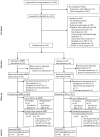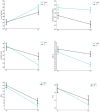The clinical effectiveness of the Mind/Body Program for Infertility on wellbeing and assisted reproduction outcomes: a randomized controlled trial in search for active ingredients
- PMID: 38852061
- PMCID: PMC11291950
- DOI: 10.1093/humrep/deae119
The clinical effectiveness of the Mind/Body Program for Infertility on wellbeing and assisted reproduction outcomes: a randomized controlled trial in search for active ingredients
Abstract
Study question: Does the Mind/Body Program for Infertility (MBPI) perform better, due to certain distinctive elements, than a partly matched support group in improving the wellbeing and medically assisted reproduction (MAR) outcomes of women with elevated distress levels in a clinical setting?
Summary answer: While robust enhancements occurred in the wellbeing overall, the cognitive behavioural and formalized stress management elements of the MBPI allowed a significantly stronger improvement in trait anxiety, but not in other mental health and MAR outcomes, compared with a support group.
What is known already: Mind-body psychological programmes adjacent to MAR have been found to improve women's mental states and possibly increase chances of pregnancy. However, not enough is known about the programme's effectiveness among patients with elevated distress levels in routine clinical settings, nor is it clear which of its particular ingredients are specifically effective.
Study design, size, duration: A pre-post design, single-centre, randomized controlled trial was performed between December 2019 and October 2022 (start and end of recruitment, respectively). The sample size (n = 168) was calculated to detect superiority of the MBPI in improving fertility-related quality of life. Randomization was computer-based, with random numbers concealing identities of patients until after allocation.
Participants/materials, setting, methods: The trial was conducted at a large university teaching hospital. A total of 168 patients were randomly assigned to the mind-body (MBPI) group (n = 84) and the fertility support (FS) control group (n = 84). Patients received a 10-week, 135-min/week group intervention, with the FS group following the same format as the MBPI group, but with a less restricted and systematic content, and without the presumed effective factors. The number of patients analysed was n = 74 (MBPI) and n = 68 (FS) for post-intervention psychological outcomes, and n = 54 (MBPI) and n = 56 (FS) for pregnancy outcomes at a 30-month follow-up.
Main results and the role of chance: Significant improvements occurred in both groups in all psychological domains (adjusted P < 0.001), except for treatment-related quality of life. Linear mixed-model regression analysis did not reveal significantly greater pre-post improvements in the MBPI group than in the FS group in fertility-related quality of life (difference in differences (DD) = 4.11 [0.42, 7.80], d = 0.32, adjusted P = 0.124), treatment-related quality of life (DD = -3.08 [-7.72, 1.55], d = -0.20, adjusted P = 0.582), infertility-specific stress (DD = -2.54 [-4.68, 0.41], d = -0.36, adjusted P = 0.105), depression (DD = -1.16 [3.61, 1.29], d = -0.13, adjusted P = 0.708), and general stress (DD = -0.62 [-1.91, 0.68], d = -0.13, adjusted P = 0.708), but it did show a significantly larger improvement in trait anxiety (DD = -3.60 [-6.16, -1.04], d = -0.32, adjusted P = 0.042). Logistic regression showed no group effect on MAR pregnancies, spontaneous pregnancies, or live births.
Limitations, reasons for caution: The follow-up only covered MAR-related medical outcomes and no psychological variables, and their rates were not equal in the two groups. Biological factors other than age, aetiology, and duration of infertility may have confounded the study results. Loss to follow-up was between 5% and 10%, which may have led to some bias.
Wider implications of the findings: The psychologically and medically heterogeneous sample, the normal clinical setting and the low attrition rate all raise the external validity and generalizability of our study. The MBPI works not only in controlled conditions, but also in routine MAR practice, where it can be introduced as a cost-effective, low-intensity psychological intervention, within the framework of stepped care. More studies are needed to further identify its active ingredients.
Study funding/competing interest(s): The authors received no financial support for the research, authorship, and/or publication of this article. The authors have no conflict of interest to disclose.
Trial registration number: ClinicalTrials.gov NCT04151485.
Trial registration date: 5 November 2019.
Date of first patient’s enrolment: 15 December 2019.
Keywords: MAR; infertility-specific distress; mind body programme; pregnancy rate; quality of life; randomized controlled trial; support group; wellbeing.
© The Author(s) 2024. Published by Oxford University Press on behalf of European Society of Human Reproduction and Embryology.
Conflict of interest statement
The authors have no conflict of interest to disclose.
Figures



Similar articles
-
The web-based Pleasure&Pregnancy programme in the treatment of unexplained infertility: a randomized controlled trial.Hum Reprod. 2024 Dec 1;39(12):2711-2721. doi: 10.1093/humrep/deae220. Hum Reprod. 2024. PMID: 39352942 Free PMC article. Clinical Trial.
-
The effect of expressive writing intervention for infertile couples: a randomized controlled trial.Hum Reprod. 2017 Feb;32(2):391-402. doi: 10.1093/humrep/dew320. Epub 2016 Dec 21. Hum Reprod. 2017. PMID: 28007790 Clinical Trial.
-
Effectiveness of two guided self-administered interventions for psychological distress among women with infertility: a three-armed, randomized controlled trial.Hum Reprod. 2019 Jul 8;34(7):1235-1248. doi: 10.1093/humrep/dez066. Hum Reprod. 2019. PMID: 31242506 Clinical Trial.
-
Behavioural modification interventions for medically unexplained symptoms in primary care: systematic reviews and economic evaluation.Health Technol Assess. 2020 Sep;24(46):1-490. doi: 10.3310/hta24460. Health Technol Assess. 2020. PMID: 32975190 Free PMC article.
-
Impact of summer programmes on the outcomes of disadvantaged or 'at risk' young people: A systematic review.Campbell Syst Rev. 2024 Jun 13;20(2):e1406. doi: 10.1002/cl2.1406. eCollection 2024 Jun. Campbell Syst Rev. 2024. PMID: 38873396 Free PMC article. Review.
Cited by
-
Healing hearts: mind-body therapy for mothers after stillbirth's silent grief.Front Psychiatry. 2025 Feb 28;16:1534616. doi: 10.3389/fpsyt.2025.1534616. eCollection 2025. Front Psychiatry. 2025. PMID: 40092463 Free PMC article.
References
-
- Aarts JWM, van Empel IWH, Boivin J, Nelen WL, Kremer JAM, Verhaak CM. Relationship between quality of life and distress in infertility: a validation study of the Dutch FertiQoL. Hum Reprod 2011;26:1112–1118. - PubMed
-
- Almutawa YM, AlGhareeb M, Daraj LR, Karaidi N, Jahrami H. A systematic review and meta-analysis of the psychiatric morbidities and quality of life differences between men and women in infertile couples. Cureus 2023;15:e37327. [Internet] Available from: https://www.cureus.com/articles/146709-a-systematic-review-and-meta-anal.... - PMC - PubMed
-
- Babor TF, Higgins-Biddle JC, Saunders JB, Monteiro MG. AUDIT. The Alcohol Use Disorder Identification Test. Guidelines for Use in Primary Care. Geneva (Switzerland: ): Department of Mental Health and Substance Dependence, World Health Organization, 2001.
-
- Balsamo M, Romanelli R, Innamorati M, Ciccarese G, Carlucci L, Saggino A. The state-trait anxiety inventory: shadows and lights on its construct validity. J Psychopathol Behav Assess 2013;35:475–486.
-
- Barbieri RL, Domar AD, Loughlin KR. Six Steps to Increased Fertility. An Integrated Medical and Mind/Body Program to Promote Conception. A Harvard Medical School Book. New York: Simon & Schuster, 2000.
Publication types
MeSH terms
Associated data
LinkOut - more resources
Full Text Sources
Medical
Research Materials

